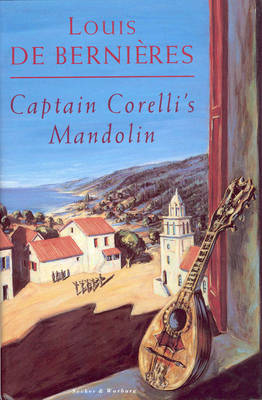
Extravagant, inventive, emotionally sweeping, Corelli's Mandolin is the story of a timeless place that one day wakes up to find itself in the jaws of history. The place is the Greek island of Cephallonia, where gods once dabbled in the affairs of men and the local saint periodically rises from his sarcophagus to cure the mad. Then the tide of World War II rolls onto the island's shores in the form of the conquering Italian army.
Caught in the occupation are Pelagia, a willful, beautiful young woman, and the two suitors vying for her love: Mandras, a gentle fisherman turned ruthless guerrilla, and the charming, mandolin-playing Captain Corelli, a reluctant officer of the Italian garrison on the island. Rich with loyalties and betrayals, and set against a landscape where the factual blends seamlessly with the fantastic, Corelli's Mandolin is a passionate novel as rich in ideas as it is genuinely moving.
I picked this book up because I hadn't read many books taking the point of Greece during WWII (then again, I hadn't really been looking haha), and it seemed interesting and had a lot of critical acclaim. The first thing I'd like to point out is how spot-on the synopsis is to the book, except for one detail: I don't know if I'd agree that there are "two suitors vying" for Pelagia's love. But whatever. Will go into that later.
- This book actually made me cry. That's not a common occurrence for me at all. The story's genuinely moving and engrossing, with characters so real that you can feel their pain, their joy, their awkwardness, and everything else in between.
- A definite pick-me-up for history lovers. It goes into the predecessor history of Greece, and plunges right into the tragic setting of WWII. Each soldier representative of a country might make you laugh only because of the other character's perspective on their strange behavior and actions, but in the end you understand that they're all the same in that they're people.
- Be sure to have your vocabulary expanded. This was a definite workout to read because the author's vocabulary is so refined and detailed, and he made sure to have words that described the situation or person perfectly. These won't be commonplace words now, but it adds on to the language and flow of the story.
- There are a lot of funny parts in here, despite the intense story. Many of them made me snicker or laugh out loud, and the ones that didn't, only didn't because it was subtle British humor. Loved it.
- The characters are too beautiful: there's the real-hero gentle giant, Carlo, who has been hiding a heavy burden of a secret all his life; the engaging and silly-insouciant titular character, Captain Corelli; the feisty Pelagia; the ugly but motherly Drosoula, who will ultimately choose to love and care for her daughter-in-law over her own son; the eccentric Dr. Iannis; the Nazi Weber, who will eventually be haunted by what he has done to his former friends. Psipsina, the pet of the family, is just as real as her human owners. Even the unsympathetic Mandras is a tragedy.
- Also very romantic - not in a silly maudlin way, but in a very well-written way. Here, love is clearly delineated from lust and pity: between Corelli and Pelagia, we understand what true love really means, whether it's between lovers or between family members. In the words of Dr. Iannis, it is the affection left over even when all the "passion" is gone.
Rating: 5 out of 5 stars!!

You are invited to follow my Christian blog
ReplyDelete